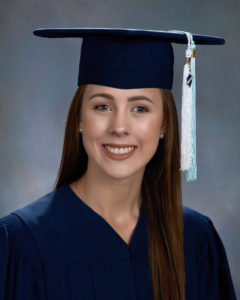
Graduates from Gloucester County Institute of Technology who earned their associate degree from Rowan College South Jersey.
In a year of virtual graduation ceremonies prompted by the coronavirus, 161 students who attend vocational technical high schools across the state got to celebrate twice – as they graduated from community college and again when they finished high school.
The students from vocational technical schools in Atlantic, Bergen, Cumberland, Gloucester, Hudson, Morris, Salem and Somerset simultaneously earned their associate’s degrees from county colleges and their high school diplomas.
It is the largest number of students graduating with associate’s degrees since county vocational-technical schools began offering dual-credit options that enable students to take college level courses as part of career and technical education programs at their high schools.
For students who pursue the opportunity to earn an associate’s degree while finishing high school, the payoff is big – a two-year head start on a college degree and their career, as well as saving tens of thousands of dollars on college tuition. In addition, the chance to try out college early gives students a clear sense of their academic and career focus when they matriculate full-time.
“Career and technical education is designed to provide clear pathways to college and career, and more than 10,000 county vocational-technical high school students take college-level classes each year,” said Judy Savage, executive director of the New Jersey Council of County Vocational-Technical Schools. “But these students who have translated that opportunity into a two-year college degree while finishing high school are extraordinary.”
The federal Carl D. Perkins Career and Technical Education Act requires career and technical education programs to include postsecondary articulation agreements that enable high school students to simultaneously earn high school and college credits. Each of the state’s 21 county vocational-technical schools has multiple articulation agreements with their county college, and other two and four-year colleges and universities, that enable students to earn credit for college-level work as part of their high school career and technical education program.
However, several have taken it a step further with agreements that give high school students the opportunity to complete an associate’s degree. And in other counties, it is the students themselves who have doubled down on available college courses to complete two-year college degrees before donning their high school cap and gown.
“New Jersey’s community colleges enjoy a special relationship with New Jersey’s county vocational technical schools, working in collaboration to prepare students for careers in the innovation economy,” said Aaron R. Fichtner, Ph.D., president of the New Jersey Council of County Colleges.
“These 161 graduates represent the best of what our relationship can deliver,” Fichtner said. “We are committed to these dual enrollment programs to allow for affordable pathways to post-secondary education and efficient entry into the workforce.”
These opportunities vary by county, with some classes taught by high school teachers who have been approved by colleges to teach postsecondary courses, and others taught by faculty on the community college campus. At some vocational schools, students start taking college courses as early as their freshman year, but nearly all spend most, if not all, of their senior year on a college campus.
“Dual credit programs enable students to begin learning about the college environment early, which assists in giving them confidence and build learning strategies to assist them better when they leave high school,” said Christine Datz, the director of Student Personnel Services at Gloucester County Institute of Technology, which had 16 students graduate with associate’s degrees from Rowan College of South Jersey.
“It is a great learning tool for them, while still having the support of a high school environment to fall back on,” Datz said.
Dual credit programs are now widely available to students in many different career programs, including manufacturing technology, health sciences, engineering, culinary arts, and computer science.
Cumberland County Technical Education Center in Vineland is the latest county vocational school to add early college options. The first class of seniors to graduate from the county’s new four-year full-time vocational high school includes 45 who have already earned their associate’s degrees from Rowan College of South Jersey, which has a campus adjacent to their high school.
“Our mission is to give Cumberland County students a pathway into the global workforce with advanced educational options,” said superintendent Dina Rossi. “The Early College High School Program helps students jumpstart their college and career planning, while reducing the financial burden of college.”
“We pay the tuition and fees and provide counseling support, but it is the students who commit to going well beyond the expectations of high school, meeting all college requirements and taking extra college classes after regular school hours,” she said. “We are incredibly proud of them.”
Applied Technology High School, which is part of Bergen County Technical Schools, is located on the campus of Bergen Community College in Paramus. Its students begin taking college-level classes freshman year in two programs, engineering technology and health professions.
By the time they’re seniors, they’re immersed in the college experience along with their senior internship,” said Andrea Sheridan, assistant superintendent at Bergen County Technical Schools.
Students earn at least 30 college credits, paid for by their school district, as part of their regular high school schedule. If they want to earn additional credits toward their associate’s degree, they can enroll in college classes after the school day ends at 2:30 p.m. at their own expense.
Applied Technology High School graduated its first class in the advanced manufacturing and engineering program in 2019; this year, 21 of the 28 seniors earned an associate’s degree in general engineering technology along with their high school diploma. The health professions program, which started more recently, has not graduated its first class yet.
The Academy for Health and Medical Sciences in the Somerset County Vocational and Technical High School has offered associate’s degrees for a decade with more than 250 graduates taking advantage of the program.
Teresa Morelli, the supervisor of the Academy for Health and Medical Sciences, said at the Academy, a typical student is high-performing, interested in a math and science career and has strong family support.
“We try to select students who truly understand and embrace the challenging curriculum, so students who are accepted are enthusiastic about the program,” Morelli said. “Besides having a leg up in their college experience, most students saw more intangible advantages, such as readiness for the college experience in terms of time management and speaking to professors, self-confidence in advocating for themselves, and pride in themselves in terms of performance and responsibility.”
Over the years, graduates of the medical academy have gone on to graduate from Brown, Stanford, Princeton, Cornell, Massachusetts Institute of Technology, Drexel, Vanderbilt, Emory, Howard, Rutgers, Columbia and other top colleges. Many students have continued to medical school or enrolled straight into a seven-year BS-MD program.
Here are some of the students who high school graduates who also earned an associate’s degree.

Hailey Sulzbach
Gloucester County
Hailey Sulzbach, 17, who is graduating from the Gloucester County Institute of Technology, received her associate’s degree from Rowan College of South Jersey with a degree in health sciences. She is planning to study molecular biology at Princeton University in the fall. She hopes to go to medical school and one day become a surgeon.
“I found the work load pretty easy to handle and I felt it gave me an edge against competition in college applications.,” said Sulzbach, who also played soccer at her school and participated in a number of clubs.
Sulzbach said she decided to pursue an associate’s degree to give herself an edge on a bachelor’s degree program.
“Having an associate’s degree provides me with a head start in my education at a state schools in order to save time and money,” Sulzbach said. “Attaining an associate’s degree prepares you exceedingly well for future education. I am a very motivated person and always have been, and I see my education as a vital part in becoming as successful as I can be. I take my schooling very seriously as it sets the foundation for my future career.”

Fedorko Rostyslav
Bergen County
Despite a hectic schedule, Rostyk Fedorko, who is graduating from ATHS this year and heading to Texas A&M in the fall, managed to play varsity football for four years, varsity lacrosse for three years and remain active in Ukrainian organizations.
The 18-year old Rutherford resident said his favorite class was machine tools.
“We got to use a milling machine and a lathe,” Fedorko said. “It was a very hands-on class that involved real life skills.”
Fedorko, who is also the class valedictorian, said the secret to his success is not procrastinating.
“I just get all my work done on time,” Fedorko said. “I didn’t have time for B.S. and that translated into my schoolwork. No B.S. Just get the job done.”
Atlantic County
Peter Esset, 18, of Atlantic City, is graduating from the Aviation Academy at Atlantic County Institute of Technology and earned his associate’s degree in aviation studies from Atlantic Cape Community College. He plans to attend one more semester at ACCC before transferring to New Jersey Institute of Technology to study mechanical engineering.
Esset, who was born in Nigeria, moved to the United States in 2012 when he was in fourth grade. He said getting his associate’s degree was a struggle that was worth the effort.
“No one on both sides of my family has made it as far as I have at this moment,” Esset said. “My motivation is to one day go back to my country and help everyone out. I recently lost my grandmother on Mother’s Day, I was hoping she would still be here to see how far I will get, but nonetheless it just gives me more fuel.”
Esset said he wants to one day return to Nigeria to create a company and employ Nigerians.
“My goal in life is to use my platform as a way to help better the lives of thousands if not millions of people,” he said.
Esset said his freshman year was difficult. He would spend three to four hours a night studying and some nights, he got little sleep.
“I had to sacrifice a bit of my social life during that first year,” Esset said. “Maintaining a relationship as well as trying to study for the biology and honors geometry test the next day was taxing. It required a certain level of time management, that I had to learn as time went by.”

Blaine Edlefsen
Morris County
Blaine Edlefsen, 18, attended the engineering design and advanced manufacturing (EDAM) program at the Morris County School of Technology and earned his associate’s degree from the County College of Morris. (CCM)
He enrolled in the vocational-technical school as a share-time student for his junior year, meaning he continued to attend his district high school in Jefferson Township while taking the technical classes offered by the vocational school on the CCM campus.
“I felt it would be a great opportunity for me to expedite my undergraduate degree and save money,” Edlefsen said. “My senior year I was encouraged to not only continue in the EDAM program, but to obtain an associate’s degree in engineering. The dual program was demanding, and offered me the opportunity to challenge myself.”
Edlefsen said he feels prepared academically and emotionally for pursuing his undergraduate degree at New Jersey Institute of Technology, where he is headed in the fall.
“Acquiring an associate’s degree was a lot of work,” he said. “I averaged six to seven days a week, from 5 to 10 hours a day. The time was filled completing homework assignments, projects and studying for exams. It has been exhausting, but a wonderful experience. I have learned a lot about myself, that I am stronger and more capable than I originally felt.”

Darrian Banks
Salem County
Darrian Banks, 18, of Quinton, is graduating from Salem County Career and Technical High School and earned an associate’s degree at Salem County College with a major in biochemistry. Banks plans to study biochemistry at Rowan University.
Banks said affordability was a major factor in her decision to pursue the associate’s degree.
“The opportunity could not be passed up,” she said. “For my degree, I was offered a lower tuition rate as well as dual credit classes, which were free for me. I paid significantly less than I would have pursuing a four-year degree.”
While in high school, she participated in sports as well as numerous clubs and will earn her EMT certification shortly.
“It was absolutely a lot of work. I spent many nights up studying, but I also worked extremely hard to make sure I sacrificed as little as possible,” Banks said. “Time management was the key to my success. I was still able to have a sliver of a social life, with those on a similar schedule as my own of course.”



